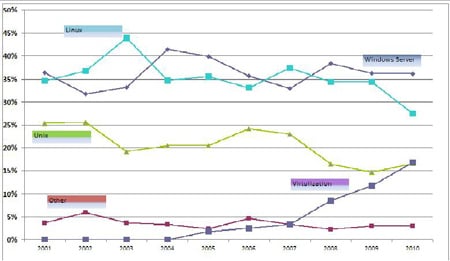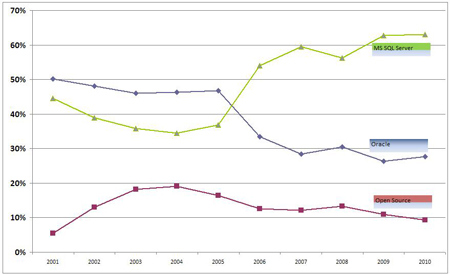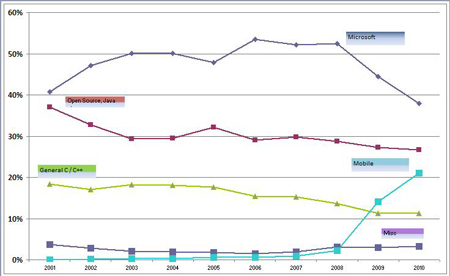Nothing is ever likely to get more heated debate in IT circles than Microsoft versus open source (ok, don’t mention Mac versus PC). Here we are going to take a look at the long-term skilling trends in operating systems, databases and development environments by examining a slice of book sales over the last decade (2.5 million data points).
Round one - server operating systems
To make the comparison valid, we have included UNIX and virtualisation and have also assumed that Linux is predominantly a server OS rather than a desktop one (not of course strictly true).
Windows server has peaks after the release of the new versions in 2004 and 2008 (not really a surprise there), but interestingly started and ended the decade with 36 per cent share of the market. In comparison Linux has not performed quite as brightly, having dropped to 28 per cent from a 35 per cent opening. There is the peak of nearly 44 per cent in 2003, this being partly attributed to the Red Hat versions 8 & 9.
Consideration must be paid to the fact that demand for skills does not necessarily match the software demand. According to the Linux Professional Institute (LPI) they are seeing exponential growth in deployment of enterprise Linux offerings, most notably Red Hat 6 (5 per cent of all Linux book sales last year) and Novell Suse.
However, the real surprise was the rise in virtualisation. This is predominantly from the growth of VMware, so clearly this is a growing trend that cannot be ignored.

Round one result - A DRAW... but watch out for virtualisation skills!
Round two - databases
This is more clear-cut as Microsoft have done an excellent job in promoting SQL server as a true enterprise database, which resulted in a real growth spurt after the release of Microsoft SQL Server 2005 to nearly two thirds of the total market. The loser here is in fact Oracle, which is down to 28 per cent from 50 per cent at the start of the decade.
Open source databases (90 per cent of which are MySQL or PostgreSQL) peaked at 20 per cent during 2003 and 2004 and now account for just about 10 per cent. However in terms of skills, we believe that, of the 50 or so open source databases, the community has greater involvement in enabling the deployment rather than through more formal books or indeed courses.

Round Two result - WINNER Microsoft ...no contest really!
Third and final round - development environments
This is probably the area with the fiercest rivalry. Database connectivity means that you can work in your favourite integrated development environment (IDE) and connect to any database you need to. But again, like server OS, there is a usurper in the ranks ... For the purposes of this analysis we have put generic C/C++ books into their own category and have grouped together a number of technologies around mobile (iPhone, Android, Objective C , Windows Mobile, etc).
Microsoft is still dominant, certainly when compared to the traditional open source groups like Java, though it dropped below 40 per cent for the first time last year, having grown to nearly 55 per cent in the middle of the decade. The growth in mobile could be a factor contributing to the drop in share for Microsoft, as Microsoft programmers seem to be adding mobile technologies to their skill sets.
Open source has had a gradual decline in share from 38 per cent down to 28 per cent and does not seem to have been affected by mobile in the same way. Currently dominated by the iPhone, mobile holds over 20 per cent of the development market. However, as we commented on last time, Android is growing rapidly and with the release of the Windows Phone 7 and the rumoured release of the new iPad, 2011 is set to be an exciting year for this fast growing area.

Round Three - WINNER Microsoft... (just) on points.
Conclusion
Microsoft is the winner of the contest in terms of the overall numbers. However the analysis has identified a shift in computing, with virtualisation and mobile programming both growing at a remarkable rate.
The debate will continue over Microsoft versus Open Source, but, with the nature of computing rapidly changing again as the analysis highlights, it could be argued that this rivalry may now be a little anachronistic. It really is the age of computing anywhere... cloud anyone?

















